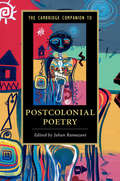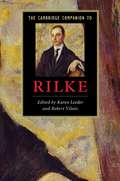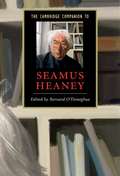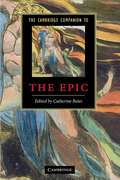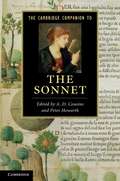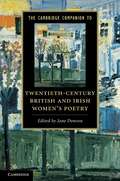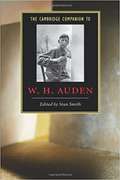- Table View
- List View
The Cambridge Companion to Lucretius
by Stuart Gillespie Philip HardieLucretius' didactic poem De rerum natura ('On the Nature of Things') is an impassioned and visionary presentation of the materialist philosophy of Epicurus, and one of the most powerful poetic texts of antiquity. After its rediscovery in 1417 it became a controversial and seminal work in successive phases of literary history, the history of science, and the Enlightenment. In this 2007 Cambridge Companion experts in the history of literature, philosophy and science discuss the poem in its ancient contexts and in its reception both as a literary text and as a vehicle for progressive ideas. The Companion is designed both as an accessible handbook for the general reader who wishes to learn about Lucretius, and as a series of stimulating essays for students of classical antiquity and its reception. It is completely accessible to the reader who has only read Lucretius in translation.
The Cambridge Companion to Milton
by Dennis DanielsonAn accessible, helpful guide for any student of Milton, whether undergraduate or graduate, introducing readers to the scope of Milton's work, the richness of its historical relations, and the range of current approaches to it. This second edition contains several new and revised essays, reflecting increasing emphasis on Milton's politics, the social conditions of his authorship and the climate in which his works were published and received, a fresh sense of the importance of his early poems and Samson Agonistes, and the changes wrought by gender studies on the criticism of the previous decade. By contrast with other introductions to Milton, this Companion gathers an international team of scholars, whose informative, stimulating and often argumentative essays will provoke thought and discussion in and out of the classroom. The Companion's reading lists and extended bibliography offer readers the necessary tools for further informed exploration of Milton studies.
The Cambridge Companion to Modern American Poetry
by Walter KalaidjianThe Cambridge Companion to Modern American Poetry comprises original essays by nineteen distinguished scholars. It offers a critical overview of major and emerging American poets of the twentieth century, in addition to critical accounts of the representative schools, movements, regional settings, archival resources, and critical reception that define modern American poetry. The Companion stretches the narrow term of "literary modernism" - which encompasses works published from approximately 1890 to 1945 - to include a more capacious and usable account of American poetry's evolution from the twentieth century to the present. The essays collected here seek to account for modern American verse against the contexts of broad political, social, and cultural fields and forces. This volume gathers together major voices that represent the best in contemporary critical approaches and methods.
The Cambridge Companion to Modernist Poetry
by Alex Davis Lee M. JenkinsThis 2007 Companion offers the most comprehensive overview available of modernist poetry, its forms, its major authors and its contexts. The first part explores the historical and cultural contexts and sexual politics of literary modernism and the avant garde. The chapters in the second part concentrate on individual authors and movements, while the concluding part offers a comprehensive overview of the early reception and subsequent canonisation of modernist poetry. As well as insightful readings of canonical poets, the Companion features extended discussions of poets whose importance is now being increasingly recognised, such as Mina Loy, poets of the Harlem Renaissance, and postcolonial poets in the Caribbean, Africa and India. While modernist poets are often thought of as difficult, these essays will help students to understand and enjoy their experimental, playful and fascinating responses to contemporary social and cultural change and their dialogue with the arts and with each other.
The Cambridge Companion to Nineteenth-Century American Poetry
by Kerry LarsonThis Companion is the first critical collection of its kind devoted solely to American poetry of the nineteenth century. It covers a wide variety of authors, many of whom are currently being rediscovered. A number of anthologies in the recent past have been devoted to the verse of groups such as Native Americans, African-Americans and women. This volume offers essays covering these groups as well as more familiar figures such as Dickinson, Whitman, Longfellow and Melville. The contents are divided between broad topics of concern such as the poetry of the Civil War or the development of the 'poetess' role and articles featuring specific authors such as Edgar Allan Poe or Sarah Piatt. In the past two decades a growing body of scholarship has been engaged in reconceptualizing and re-evaluating this largely neglected area of study in US literary history - this Companion reflects and advances this spirit of revisionism.
The Cambridge Companion to Ovid
by Philip HardieOvid was one of the greatest writers of classical antiquity, and arguably the single most influential ancient poet for post-classical literature and culture. In this Cambridge Companion, chapters by leading authorities from Europe and North America discuss the backgrounds and contexts for Ovid, the individual works, and his influence on later literature and art. Coverage of essential information is combined with exciting critical approaches. This Companion is designed both as an accessible handbook for the general reader who wishes to learn about Ovid, and as a series of stimulating essays for students of Latin poetry and of the classical tradition.
The Cambridge Companion to Piers Plowman
by Andrew Cole Andrew GallowayPiers Plowman has long been considered one of the greatest poems of medieval England. Current scholarship on this alliterative masterpiece looks very different from that available even a decade ago. New information about the manuscripts of the poem, new historical discoveries, and new investigations of its literary, cultural and theoretical scope have fundamentally altered the very meaning of Langland's art. This Companion thus critically surveys traditional scholarship, with the aim of recuperating its best insights, and it ventures forth into newer areas of inquiry attuned to questions of social setting, institutional context, intellectual and literary history, theory, and the revitalized fields of codicology and paleography. By proceeding through chapters that offer cumulatively wider views as well as stand-alone analyses of topics most crucial to understanding Piers Plowman, this Companion gives serious students and seasoned scholars alike up-to-date knowledge of this intricate and beautiful poem.
The Cambridge Companion to Postcolonial Poetry
by Jahan RamazaniThe Cambridge Companion to Postcolonial Poetry is the first collection of essays to explore postcolonial poetry through regional, historical, political, formal, textual, gender, and comparative approaches. The essays encompass a broad range of English-speakers from the Caribbean, Africa, South Asia, and the Pacific Islands; the former settler colonies, such as Canada, Australia, and New Zealand, especially non-Europeans; Ireland, Britain's oldest colony; and postcolonial Britain itself, particularly black and Asian immigrants and their descendants. The comparative essays analyze poetry from across the postcolonial anglophone world in relation to postcolonialism and modernism, fixed and free forms, experimentation, oral performance and creole languages, protest poetry, the poetic mapping of urban and rural spaces, poetic embodiments of sexuality and gender, poetry and publishing history, and poetry's response to, and reimagining of, globalization. Strengthening the place of poetry in postcolonial studies, this Companion also contributes to the globalization of poetry studies.
The Cambridge Companion to Rilke
by Karen Leeder Robert VilainOften regarded as the greatest German poet of the twentieth century, Rainer Maria Rilke (1875-1926) remains one of the most influential figures of European modernism. In this Companion, leading scholars offer informative and thought-provoking essays on his life and social context, his correspondence, all his major collections of poetry including most famously the Duino Elegies and Sonnets to Orpheus, and his seminal novel of Modernist anxiety, The Notebooks of Malte Laurids Brigge. Rilke's critical contexts are explored in detail: his relationship with philosophy and the visual arts, his place within modernism and his relationship to European literature, and his reception in Europe and beyond. With its invaluable guide to further reading and a chronology of Rilke's life and work, this Companion will provide an accessible, engaging account of this extraordinary poet whose legacy looms so large today.
The Cambridge Companion to Robert Frost
by Robert FaggenThis 2001 collection of specially-commissioned essays by experts in the field explores key dimensions of Robert Frost's poetry and life. Frost remains one of the most memorable and beguiling of modern poets. Writing in the tradition of Virgil, Milton, and Wordsworth, he transformed pastoral and georgic poetry both in subject matter and form. Mastering the rhythms of ordinary speech, Frost made country life the point from which to view the world and the complexities of human psychology. The essays in this volume enable readers to explore Frost's art and thought, from the controversies of his biography to his subtle reinvention of poetic and metric traditions and the conflicts in his thought about politics, gender, science and religion. This volume will bring fresh perspectives to the lyric, narrative and dramatic poetry of an American master, and its chronology and guide to further reading will prove valuable to scholars and students alike.
The Cambridge Companion to Seamus Heaney
by Bernard O'DonoghueSeamus Heaney is a unique phenomenon in contemporary literature, as a poet whose individual volumes (such as his Beowulf translation, and individual volumes of poems such as Electric Light and District and Circle) have been high in the bestseller lists for decades. Since winning the Nobel Prize for Literature, he has come to be considered one of the most important English language poets in the world. This Companion gives an up-to-date overview of his career thus far, and of his reception in Ireland, England and around the world. Its distinguished contributors offer detailed readings of all his major publications, in poetry, prose and translation. The essays further explore the central themes of his poetry, his relations with other writers, and his prose writing. Designed for students, this volume will also have much to interest and inform the general reader and admirer of Heaney's unique poetic voice.
The Cambridge Companion to Shelley
by Timothy MortonPercy Bysshe Shelley (1792-1822) was an extraordinary poet, playwright and essayist, revolutionary both in his ideas and in his artistic theory and practice. This 2006 collection of original essays by an international group of specialists is a comprehensive survey of the life, works and times of this radical Romantic writer. Three sections cover Shelley's life and posthumous reception; the basics of his poetry, prose and drama; and his immersion in the currents of philosophical and political thinking and practice. As well as providing a wide-ranging look at the state of existing scholarship, the Companion develops and enriches our understanding of Shelley. Significant new contributions include fresh assessments of Shelley's narratives, his view of philosophy, and his role in emerging views about ecology. With its chronology and guide to further reading, this lively and accessible Companion is an invaluable guide for students and scholars of Shelley and of Romanticism.
The Cambridge Companion to Spenser
by Andrew HadfieldIn this accessible and rigorous introduction to Spenser, fourteen specially-commissioned essays provide all the essential information required to appreciate and understand Spenser's rewarding and challenging work. The Companion guides the reader through Spenser's poetry and prose, and provides extensive commentary on his life, the historical and religious context in which he wrote, his wide reading in Classical, European and English poetry, his sexual politics and use of language. A chronology and further reading lists make this volume indispensable for any student of Spenser.
The Cambridge Companion to Sylvia Plath
by Jo GillThe controversies that surround Sylvia Plath's life and work imply that her poems are more read and studied now than ever before. This Companion provides a comprehensive and authoritative overview of the place in twentieth-century culture of Sylvia Plath's poetry, prose, letters and journals. The newly commissioned essays by leading international scholars represent a spectrum of critical perspectives. They pay particular attention to key debates and to well-known texts such as The Bell Jar, while offering original and thought-provoking readings to new as well as more seasoned Plath readers.
The Cambridge Companion to T. S. Eliot
by A. David MoodyAn international team of leading T. S. Eliot scholars contribute studies of different facets of the writer's work to build up a carefully coordinated and fully rounded introduction. Five chapters give a complete account of Eliot's poems and plays, while others assess the major aspects of his life and thought. Later chapters place his work in historical perspective. There is a full review of Eliot studies, and a useful chronological outline. Taken as a whole, this Companion comprises an essential handbook for students and readers of T. S. Eliot.
The Cambridge Companion to Ted Hughes
by Terry GiffordThis is a story of the raw grief of a mother who loses her son and whose life is transformed in the process. Some people live life at a higher pace-and depths- than most of us . Adam Pinkerfield was one of those people and he was deeply loved by those he touched. Sadly one day he flew too high and didn't come back. This book is his mother Sharon's story of the trauma that followed and the multitude of experiences and learnings that came from this deeply sad event. Take several deep breaths before you enter with her, let yourself be touched, moved and even shaken as her story unfolds. Always remember, in every tragedy, however dreadful, hidden somewhere is a blessing. Leo Rutherford, Shaman and author.
The Cambridge Companion to the Epic
by Catherine BatesEvery great civilisation from the Bronze Age to the present day has produced epic poems. Epic poetry has always had a profound influence on other literary genres, including its own parody in the form of mock-epic. This Companion surveys over four thousand years of epic poetry from the Babylonian Epic of Gilgamesh to Derek Walcott's postcolonial Omeros. The list of epic poets analysed here includes some of the greatest writers in literary history in Europe and beyond: Homer, Virgil, Dante, Camões, Spenser, Milton, Wordsworth, Keats and Pound, among others. Each essay, by an expert in the field, pays close attention to the way these writers have intimately influenced one another to form a distinctive and cross-cultural literary tradition. Unique in its coverage of the vast scope of that tradition, this book is an essential companion for students of literature of all kinds and in all ages.
The Cambridge Companion to the Sonnet
by A. D. Cousins Peter Howarth"Beginning with the early masters of the sonnet form, Dante and Petrarch, the Companion examines the reinvention of the sonnet across times and cultures, from Europe to America. In doing so, it considers sonnets as diverse as those by William Shakespeare, William Wordsworth, George Herbert and e. e. cummings. The chapters explore how we think of the sonnet as a 'lyric' and what is involved in actually trying to write one. The book includes a lively discussion between three distinguished contemporary poets - Paul Muldoon, Jeff Hilson and Meg Tyler - on the experience of writing a sonnet, and a chapter which traces the sonnet's diffusion across manuscript, print, screen and the internet. A fresh and authoritative overview of this major poetic form, the Companion expertly guides the reader through the sonnet's history and development into the global multimedia phenomenon it is today"--
The Cambridge Companion to Twentieth-Century British and Irish Women's Poetry
by Jane DowsonThis Companion provides new ways of reading a wide range of influential women's poetry. Leading international scholars offer insights on a century of writers, drawing out the special function of poetry and the poets' use of language, whether it is concerned with the relationship between verbal and visual art, experimental poetics, war, landscape, history, cultural identity or 'confessional' lyrics. Collectively, the chapters cover well established and less familiar poets, from Edith Sitwell and Mina Loy, through Stevie Smith, Sylvia Plath and Elizabeth Jennings to Anne Stevenson, Eavan Boland and Jo Shapcott. They also include poets at the forefront of poetry trends, such as Liz Lochhead, Jackie Kay, Patience Agbabi, Caroline Bergvall, Medbh McGuckian and Carol Ann Duffy. With a chronology and guide to further reading, this book is aimed at students and poetry enthusiasts wanting to deepen their knowledge of some of the finest modern poets.
The Cambridge Companion to Twentieth-Century English Poetry
by Neil CorcoranThe last century was characterised by an extraordinary flowering of the art of poetry in Britain. These specially commissioned essays by some of the most highly regarded poetry critics offer a stimulating and reliable overview of English poetry of the twentieth century. The opening section on contexts will both orientate readers relatively new to the field and provide provocative syntheses for those already familiar with it. Following the terms introduced by this section, individual chapters cover many ways of looking at the 'modern', the 'modernist' and the 'postmodern'. The core of the volume is made up of extensive discussions of individual poets, from W. B. Yeats and W. H. Auden to contemporary poets such as Simon Armitage and Carol Ann Duffy. In its coverage of the development, themes and contexts of modern poetry, this Companion is the most useful guide available for students, lecturers and readers.
The Cambridge Companion to Victorian Poetry
by Joseph BristowThis Companion to Victorian Poetry provides an introduction to many of the pressing issues that absorbed the attention of poets from the 1830s to the 1890s. It introduces readers to a range of topics - including historicism, patriotism, prosody, and religious belief. The thirteen specially-commissioned chapters offer insights into the works of well-known figures such as Matthew Arnold, Robert Browning and Alfred Tennyson, and the writings of women poets - like Michael Field, Amy Levy and Augusta Webster - whose contribution to Victorian culture has in more recent years been acknowledged by modern scholars. Revealing the breadth of the Victorians' experiments with poetic form, this Companion also discloses the extent to which their writings addressed the prominent intellectual and social questions of the day. The volume, which will be of interest to scholars and students alike, features a detailed chronology of the Victorian period and a comprehensive guide to further reading.
The Cambridge Companion to Virgil
by Charles MartindaleVirgil became a school author in his own lifetime and the centre of the Western canon for the next 1800 years, exerting a major influence on European literature, art, and politics. This Companion is designed as an indispensable guide for anyone seeking a fuller understanding of an author critical to so many disciplines. It consists of essays by seventeen scholars from Britain, the USA, Ireland and Italy which offer a range of different perspectives both traditional and innovative on Virgil's works, and a renewed sense of why Virgil matters today. The Companion is divided into four main sections, focussing on reception, genre, context, and form. This ground-breaking book not only provides a wealth of material for an informed reading but also offers fresh and sophisticated insights which point to the shape of Virgilian scholarship and criticism to come.
The Cambridge Companion to W. H. Auden
by Stan SmithThis volume brings together specially commissioned essays by some of the world's leading experts on the life and work of W. H. Auden, one of the major English-speaking poets of the twentieth century. The volume's contributors include a prize-winning poet, Auden's literary executor and editor, and his most recent, widely acclaimed biographer. It offers fresh perspectives on his work from Auden critics, alongside specialists from such diverse fields as drama, ecological and travel studies. It provides scholars, students and general readers with a comprehensive and authoritative account of Auden's life and works in clear and accessible English. Besides providing authoritative accounts of the key moments and dominant themes of his poetic development, the Companion examines his language, style and formal innovation, his prose and critical writing and his ideas about sexuality, religion, psychoanalysis, politics, landscape, ecology, and globalisation. It also contains a comprehensive bibliography of writings about Auden.
The Cambridge Companion to Wallace Stevens
by John N. SerioWallace Stevens is a major American poet and a central figure in modernist studies and twentieth-century poetry. This Companion introduces students to his work. An international team of distinguished contributors presents a unified picture of Stevens' poetic achievement. The Introduction explains why Stevens is among the world's great poets and offers specific guidance on how to read and appreciate his poetry. A brief biographical sketch anchors Stevens in the real world and illuminates important personal and intellectual influences. The essays following chart Stevens' poetic career and his affinities with both earlier and contemporary writers, artists, and philosophers. Other essays introduce students to the peculiarity and distinctiveness of Stevens' voice and style. They explain prominent themes in his work and explore the nuances of his aesthetic theory. With a detailed chronology and a guide to further reading, this Companion provides all the information a student or scholar of Stevens will need.
The Cambridge Companion to William Blake
by Morris EavesPoet, painter, and engraver William Blake died in 1827 in obscure poverty with few admirers. The attention paid today to his remarkable poems, prints, and paintings would have astonished his contemporaries. Admired for his defiant, uncompromising creativity, he has become one of the most anthologized and studied writers in English and one of the most studied and collected British artists. His urge to cast words and images into masterpieces of revelation has left us with complex, forceful, extravagant, some times bizarre works of written and visual art that rank among the greatest challenges to plain understanding ever created. This Companion aims to provide guidance to Blake's work in fresh and readable introductions: biographical, literary, art historical, political, religious, and bibliographical. Together with a chronology, guides to further reading, and glossary of terms, they identify the key points of departure into Blake's multifarious world and work.

